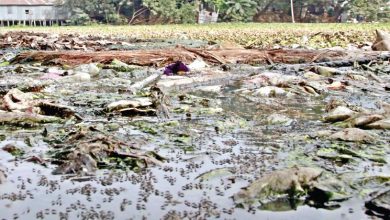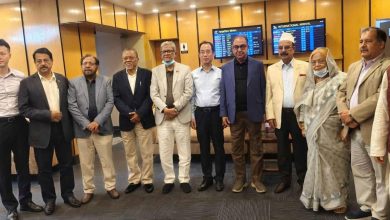5 renewable power projects on cards to counter global fuel price surge
Projects, so far approved or under scrutiny, would have a capacity of 2,700MW from renewable sources

Responding to the pains of the Ukraine War-driven surge in energy costs and a commitment to sustainable development, Bangladesh is acting positively towards renewable energy investments. Currently, five fresh renewable power projects with a combined generating capacity of 700MW are undergoing evaluation.
Renewable power projects with a capacity of over 1,200MW have been approved and signed this year. Those include Denmark’s $1.3 billion offshore wind energy proposal, which secured government approval for feasibility study in October.
These so far approved or under scrutiny projects, along with existing ones, would have a capacity of 2,700MW from renewable sources.
The government has already approved tariffs for the purchase of 1,241MW of renewable energy from nine other projects in the first five months of the current fiscal year. Investments in these projects came from various countries including Japan, China, and Saudi Arabia.
Most of the solar power plant projects were approved with tariffs set at $0.10 per kilowatt equivalent to Tk11.03 at 1 Dec 2023 rate.
The Power Division is now evaluating proposals for one 100MW wind power plant and four solar power plants with 600MW capacity. These proposals have been submitted by local companies partnering with investment institutions from various countries, including Hong Kong, Vietnam, and the United Kingdom.
One megawatt equals one million watts or 1,000 kilowatts, roughly enough electricity for the demand of 750 urban homes at once.
The Proposal Processing Committee (PPC) under the Power Division is currently in discussions with project investors regarding the tariffs at which the government will procure electricity from the plants.
The processing committee, headed by the power division’s Senior Secretary Md Habibur Rahman, is working to speed up the evaluation of renewable energy project proposals.
Md Habibur Rahman told The Business Standard that the government’s policy is geared towards gradually reducing dependence on fossil fuels and transitioning towards renewable energy.
“This is why we are encouraging local and foreign private investments in renewable energy and ensuring a favourable environment for interested investors,” he said, adding that investment in this sector is attractive for entrepreneurs due to the availability of low-interest bank loans for setting up solar power plants.
“We are offering fair tariff benefits and a guaranteed power purchase for a period of 20 years from the outset. With the amount of money required to establish a plant, entrepreneurs can expect a full return on their investment within 10 years of production, thanks to the government-set tariff,” the power secretary added.
As there is an opportunity to receive policy support from the government and reap business benefits, several countries are investing in renewable energy through consortiums or joint ventures with Bangladeshi companies. Till now, the majority of investment proposals received or those whose tariffs have been approved by the Cabinet Committee on Government Procurement are from foreign investors.
A rush towards renewables
Power Division officials said although the government is working toward a target of 10% electricity generation from renewable sources, including solar, hydro, and wind, by 2025, it was not given much importance before the Ukraine-Russia war.
According to the Bangladesh Power Development Board, the country currently generates 2% of its electricity generation capacity from renewable sources. Achieving the Sustainable Development Goals, or SDGs, requires at least 12% of electricity from these sources.
Power Development Board data shows the production cost per unit of electricity in the country’s diesel-powered plants is Tk22.
The cost of generating electricity from liquified natural gas (LNG) is Tk10 per unit, Tk4 per unit from local coal in Barapukuria, Tk6 per unit from imported coal, and Tk12 per unit from furnace oil. However, these sources of electricity are not environmentally friendly. The production cost per unit of solar power in Bangladesh is Tk8-10.
Following the onset of the war, the energy sector has prioritised renewable energy in response to the abnormal surge in prices of fuel oil, liquefied natural gas (LNG), and coal in the international market.
As part of this initiative, the Power Division is reviewing proposals for establishing solar or wind power plants from the private sector. It aims to promptly finalise tariffs and sign contracts.
Power Division officials said despite not utilising electricity from fossil fuel-based private sector power plants, the Bangladesh government is still obligated to pay substantial capacity charges. In contrast, there are no such capacity charges for solar or renewable power plants.
“These plants are being approved on a ‘no electricity, no payment’ basis, and private entrepreneurs have to arrange land for setting up the centres. Even if an entrepreneur fails to set up a plant after getting approval, the government has no obligations,” said an official.
When asked about the sudden increase in interest from domestic and foreign companies in renewable energy, David Hasnat, managing director of Viyellatex and the investor of the largest government-approved solar power plant in Bangladesh, told TBS, “The importance of renewable energy at the global level has been increasing for the past one-and-a-half years.”
“Globally, companies involved in fossil fuel extraction, refining, and consumption are emitting a significant amount of carbon dioxide. Consequently, they are experiencing a loss of image at the international level,” he said.
“These companies are globally investing in renewable energy, including solar power, to enhance their brand value and restore their image through sustainable business,” David Hasnat said.
Viyellatex is in the process of establishing a 300MW solar power plant at Rampal in Bagerhat in collaboration with the Saudi company Aqua Power Company Limited, at a cost of $430 million.
David Hasnat said the primary challenge in setting up solar power plants in Bangladesh is acquiring sufficient land. While 20 to 25 solar power plants have received approval, many have been unable to start work due to problems in getting land.
He, however, noted that their efforts in setting up the 300 MW solar power plant in Rampal are progressing at full throttle.



